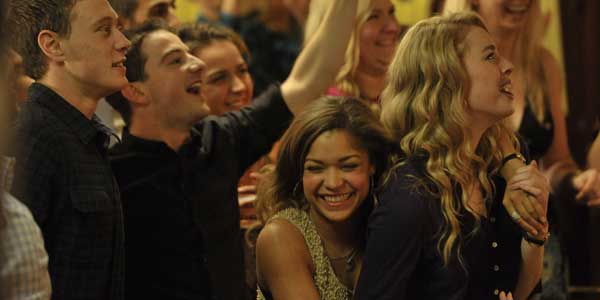
Director: Dexter Fletcher
Running Time: 100 mins
Certificate: PG
Release Date: January 27th 2013

Unless you’re a fan, you could be forgiven to think Scottish musical twins The Proclaimers only had one song, the ubiquitous I’m Gonna Be (500 Miles), although some might also be able to tell you Letters From America is also one of their tunes. As a result to some it may seem odd to base a musical around their songs, but it’s actually a surprisingly smart idea.
Firstly, you may well recognise more of their songs than you expected, and it’s certainly true their music is pretty well known in Scotland, even if not all of it is as popular in the rest of the UK. Secondly, while many acts sing rather airy tunes that talk about abstract ideas and attempt to be universal by being deliberately vague, The Proclaimers music is far more personal, with seemingly naïve but actually rather complex lyrics that place the music resolutely in the shoes of someone living a real life. The songs reference specific Scottish locations and talk about the sort of small scale events of life and how they affect someone emotionally.
As a result, some of the songs have stories that easily be borrowed from, while many of them already sound like they’re talking about things ‘in character’ and lend themselves to the jukebox musical format.
The plot follows army lads Davy (George MacKay) and Ally (Kevin Guthrie), who’ve just returned to Edinburgh after witnessing one of their friends being terribly injured by a roadside bomb. Ally is hoping to take up where he left off with Davy’s sister, however she has dreams of her own which may not jibe with Ally’s expectations. Davy meanwhile embarks on a relationships with an English lass, although he may have to change how he things about things if he wants it to work.
Davy’s parents meanwhile have their own issues after Rab (Peter Mullan) has a blast from the past when a long lost daughter shows up. He initially tries to keep from his wife, Jean (Jane Horrocks), but secret have a way of coming out.
The plots of musicals are often fairly simple, and there’s little doubt that Sunshine On Leith is slighter than most. Not a huge amount happens, to the point where it often seems to be heading towards a moment of major action, before sidestepping that and going somewhere else instead. There is drama, but it’s certainly not taken as far as it might have been. It’s particularly noticeable at the end, when it’s easy to see how the whole thing could have been done on a much bigger scale, especially considering the song it’s inevitably been leading up to.
Indeed it’s interesting in the deleted scenes that there’s a different ending where the dialogue is the same, but that one underplays things to the extent where it feels more singalong than the end of a movie. You can certainly see why they went for something else, even if what we end up with still feels like it’s deliberately going the whole hog and perhaps being accused of dipping into melodrama. And by the way, it doesn’t take a genius to work out that that final songs will be.
The lack of action and tendency towards predictability might have undermined things, but oddly it works. Instead of lots of plot, Sunshine On Leith concentrates on real people living relatively small, normal lives – even if these ‘real’ people do have a tendency to burst into song at any moment. There are moments where it might have made sense for it to push its neck out a little further, but by sticking to music and character rather than lots of plot, it works surprisingly well. When one of the characters sings it really does feel like you’re getting to hear the thing many of us feel, but which we rarely articulate.
And the reason it really works well is that it spends so much time simply trying to make the audience feel good. It creates an intimacy and camaraderie, drawing the audience in and trying to put a big fat smile on their face. It’s bright, cheery and unabashedly sweet, with plenty of songs designed to lift your heart and leave you with a warm buzz as the credits roll. Heard-hearted cynics will inevitably find the whole thing sentimental and twee, but if you have an ounce of romance and rose-tinted optimism in your soul, you’ll find it difficult not to be won over by Sunshine On Leith’s charms.
Overall Verdict: A simple but surprisingly warm and affecting jukebox musical that might have benefitted from making more of its ending, but which spends so much time making you feel good that it’ll ensure everyone but the true cynic will feel all warm and fuzzy.
Reviewer: Tim Isaac





Leave a Reply (if comment does not appear immediately, it may have been held for moderation)